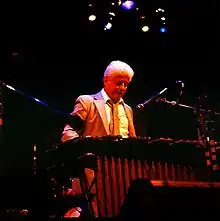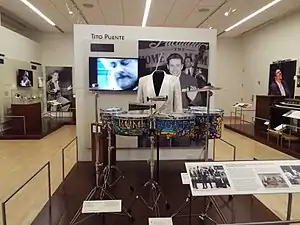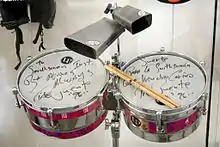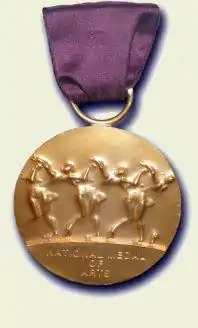Tito Puente | |
|---|---|
 Puente in 1996 | |
| Background information | |
| Birth name | Ernest Anthony Puente Jr. |
| Born | April 20, 1923 New York City, U.S. |
| Died | June 1, 2000 (aged 77) New York City, U.S. |
| Genres | |
| Occupation(s) |
|
| Instrument(s) | |
| Years active | 1946–2000 |
| Labels |
|
Ernest Anthony Puente Jr. (April 20, 1923 – June 1, 2000),[1] commonly known as Tito Puente, was an American musician, songwriter, bandleader, timbalero, and record producer. He composed dance-oriented mambo and Latin jazz music.
Puente and his music have appeared in films including The Mambo Kings and Fernando Trueba's Calle 54. He guest-starred on television shows, including Sesame Street and The Simpsons two-part episode "Who Shot Mr. Burns?".
Early life
Puente was born on April 20, 1923, at Harlem Hospital Center in the New York borough of Manhattan, the son of Ernest and Felicia Puente, Puerto Ricans living in New York City's Spanish Harlem.[2][3] His family moved frequently, but he spent the majority of his childhood in Spanish Harlem.[2] Puente's father was the foreman at a razorblade factory.[4] His family called him Ernestito, Spanish for Little Ernest, and this became shortened to "Tito".[5]
As a child, he was described as hyperactive, and after neighbors complained of hearing seven-year-old Puente beating on pots and window frames, his mother sent him to 25-cent piano lessons.[4] He switched to percussion by the age of 10, drawing influence from jazz drummer Gene Krupa.[4] He later created a song-and-dance duo with his sister Anna in the 1930s and intended to become a dancer, but an ankle tendon injury prevented him from pursuing dance as a career.[3][4] When the drummer in Machito's band was drafted to the army, Puente subsequently took his place.[4]
Career

Puente served in the Navy for three years during World War II after being drafted in 1942.[6] He was discharged with a Presidential Unit Citation for serving in nine battles on the escort air craft carrier USS Santee (CVE-29) where his duties included playing alto saxophone and clarinet in the ship's big band as well as occasionally drum set, piano during mess hall, ship's bugler, and machine gunner during battles. The GI Bill allowed him to study music at Juilliard School of Music, where he completed his formal education in conducting, orchestration, and theory after three years.
We play jazz with the Latin touch, that's all, you know.[7]
During the 1950s, Puente was at the height of his popularity and helped to bring Cuban and Caribbean sounds like mambo, son, and cha-cha-chá, to mainstream audiences. His album Dance Mania was released in 1958.
Among his compositions is the cha-cha "Oye como va" (1963),[8] popularized by Latin rock musician Carlos Santana and later interpreted, among others, by Julio Iglesias, Irakere and Celia Cruz. In 1969, he received the key to the City of New York from former Mayor John Lindsay. In 1992, he was inducted into the National Congressional Record, and in 1993 he received the James Smithson Bicentennial Medal from the Smithsonian.[9]

Puente is one of the subjects of a television production called La Epoca,[10] a film about the Palladium era in New York, Cuban music and rhythms, mambo and salsa as dances and music and much more. The film discusses many of Puente's, as well as Arsenio Rodríguez's, contributions and features interviews with some of the musicians Puente recorded with.
Personal life and death
Puente's oldest son Ron Puente is from a first marriage to Mirta Sanchez. Richard "Richie" Puente was the percussionist in the 1970s funk band Foxy. Puente's youngest son, Tito Puente Jr., has performed and recorded many of Puente's songs. His daughter Audrey Puente is a television meteorologist for WNYW and WWOR-TV in New York City.
After a show in Puerto Rico on May 31, 2000, Puente suffered a massive heart attack and was flown to New York City for surgery to repair a heart valve, but complications developed, and he died on June 1, 2000.[11] He was posthumously awarded the Grammy Lifetime Achievement Award in 2003.
Awards and recognition


- In 1995, Puente received the Billboard Latin Music Lifetime Achievement Award.[12]
- On September 10, 2007, a United States Post Office in Spanish Harlem was named after him at a ceremony presided over by House Ways and Means Committee Chair Charles Rangel and Rep. José Serrano.
- An amphitheater was named after him at Luis Muñoz Marín Park, next to the Roberto Clemente Coliseum, in San Juan, Puerto Rico.
- In 1995, Puente was awarded an Honorary Doctorate of Music from Berklee College of Music.[13]
- Puente performed at the closing ceremonies at the 1996 Summer Olympics in Atlanta, Georgia. The timbales he used are displayed at the National Museum of American History in Washington, D.C.
- In 1997, he was awarded the National Medal of Arts.[14]
- In 1990, he received a Star on the Hollywood Walk Of Fame.[15]
- In 1984, he received an honorary Decree from the Los Angeles City Council.
- On June 5, 2005, Puente was honored by Union City, New Jersey with a star on the Walk of Fame at Union City's Celia Cruz Park.[16]
- In 1999, he was inducted into the International Latin Music Hall of Fame.[17]
- On May 19, 1999, he received an honorary Mus.D degree from Columbia University.[18][19]
- On August 20, 2000, East 110th Street in Spanish Harlem was named 'Tito Puente Way'.
- In 2011, the US Postal Service issued a commemorative postage stamp in his likeness as part of their Latin Legends series. [20]
- On October 11, 2022, Puente was honored with a Google Doodle in honor of Hispanic Heritage Month.[21]
Discography
As leader
- Mambos Vol. 1 & Vol. 2 (10" LP's, 1951) Tico
- Mambos Vol. 3 & Vol. 4 (10" LP's, 1952) Tico
- Mambos Vol. 5 & King of the Mambo, Vol. 6 (10" LP's, 1953) Tico
- Mamborama (1955) Tico
- Puente In Percussion (1956) Tico
- Cha Cha Cha's For Lovers (1956) Tico
- Cuban Carnival (1956) RCA Victor
- Night Beat (1957) RCA Victor
- Top Percussion (1958) RCA Victor
- Herman's Heat & Puente's Beat! with Woody Herman (1958) Everest (reissued in 2001 as Herman Meets Puente)
- Dance Mania (1958) RCA Victor
- Dancing Under Latin Skies (1959)
- Mucho Cha-Cha (1959)[22]
- Tambo (1960) RCA Victor
- Cha Cha With Tito Puente at Grossinger's (1960) RCA Victor
- El Rey: Bravo (1962) Tico
- Tito Puente Swings, The Exciting Lupe Sings (1965)
- El Rey (The King) (1968) Tico
- El Rey: Tito Puente & His Latin Ensemble (1984) Concord Picante
- Mambo Diablo (1985) Concord Picante
- Sensacion (1986) Concord Picante
- Un Poco Loco (1987) Bellaphon
- Goza Mi Timbal (1989) Concord Picante
- Tito's Idea (1995) Tropi Jazz / RMM
- Jazzin' (with India) (1996) Tropi Jazz / RMM
- Percussion's King (1997)
- Selection of Mambo & Cha Cha Cha (1997)
- 50 Years of Swing (1997)
- Tito Meets Machito: Mambo Kings (1997)
- Cha Cha Cha Rumba Beguine (1998)
- Dance Mania '99: Live at Birdland (1998)
- The Very Best of Tito Puente (1998)
- Timbalero Tropical (1998)
- Yambeque (1998)
- Absolute Best (1999)
- Carnival (1999)
- Colección original (1999)
- Golden Latin Jazz All Stars: In Session (1999)
- Latin Flight (1999)
- Latin Kings (1999)
- Lo mejor de lo mejor (1999)
- Mambo Birdland (1999)
- Special Delivery featuring Maynard Ferguson (1996)
- Rey (2000)
- His Vibes & Orchestra (2000)
- Cha Cha Cha for Lovers (2000)
- Homenaje a Beny Moré Vol. 3 (2000) featuring Celia Cruz
- Dos ídolos. Su música (2000)
- Tito Puente y su Orquesta Mambo (2000)
- The Complete RCA Recordings. Vol. 1 (2000)
- The Best of the Concord Years (2000)
- Por fin (Finally) (2000)
- Party with Puente! (2000)
- Masterpiece/Obra maestra (2000) with Eddie Palmieri
- Mambo Mambo (2000)
- Mambo King Meets the Queen of Salsa (2000)
- Latin Abstract (2000)
- Kings of Mambo (2000)
- Cha Cha Cha for Lovers (2000)
- The Legends Collection: Tito Puente & Celia Cruz (2001)
- The Complete RCA Recordings, Vol. 2 (2001)
- RCA Recordings (2001)
- Puente caliente (2001)
- The Best of... (2001)
- King of Mambo (2001)
- El Rey: Pa'lante! Straight! (2001)
- Cocktail Hour (2001)
- Selection. King of Mambo (2001)
- Undisputed (2001)
- Fiesta (2002)
- Colección Diamante (2002)
- Tito Puente y Celia Cruz (2002)
- Live at the Playboy Jazz Festival (2002)
- King of Kings: The Very Best of Tito Puente (2002)
- Hot Timbales! (2002)
- Dr. Feelgood (2002)
- Carnaval de éxitos (2002)
- Caravan Mambo (2002)
- We Love Salsa (2006)
- Quatro: The Definitive Collection(2012)
As sideman
With Dizzy Gillespie
- Rhythmstick (1990)
With Benny Golson
- Remembering Clifford (Milestone, 1998)
With Quincy Jones
- Quincy Plays for Pussycats (Mercury, 1959–65 [1965])
- With Hilton Ruiz
- Rhythm in the House (RMM, 1976 [1998])
With Sonny Stitt
- The Matadors Meet the Bull (Roulette, 1965)
With Bobby Sanabria
- ¡NYC Aché! (Flying Fish Records, 1993)
Filmography
Selected feature films
- Armed and Dangerous (1986) as Band Leader
- Radio Days (1987) as Latin Bandleader
- The Mambo Kings (1992) as Himself
Documentaries
Concert films
- Tito Puente – Live in Montreal (Montreal Jazz Festival) (1983) (2003)
- Tito Puente – Palladium Days (Newport Jazz Festival) (1997)
The Simpsons
Puente appeared in the two-part whodunit drama "Who Shot Mr. Burns?" in the sixth season finale and seventh season premiere of American comedy cartoon show The Simpsons in 1995. In the shows, Puente joins Springfield Elementary School as a music teacher after the school discovers it is located over an oil well. However, Mr. Burns manages to pump the oil first, which makes him the legal owner of the well. This causes the school to fall into debt with budget cuts to the music and maintenance departments, causing Puente to lose his job. When Burns is later shot, Puente becomes one of the prime suspects but manages to clear himself by performing one of his songs for Chief Wiggum. Seven alternative endings were filmed of various characters shooting Burns; Puente is one of the alternates. Although all endings were animated, the ending of Maggie Simpson shooting Burns was the ending chosen to air.
The Emmy-nominated song "Señor Burns" from the episode is featured on both the 1997 album Songs in the Key of Springfield and the 1999 album Go Simpsonic with The Simpsons.
References
- ↑ Tito Puente biography. BookRags.com. Retrieved October 31, 2012.
- 1 2 Siegal, Nina (June 6, 2000). "The New York Legacy of Tito Puente". The New York Times. Retrieved March 26, 2012.
- 1 2 Ginell, Richard S. "Tito Puente – Biography". AllMusic. Retrieved March 26, 2012.
- 1 2 3 4 5 Obejas, Achy (June 2, 2000). "He Beat The Drum For Latin Music". Chicago Tribune. Retrieved March 23, 2012.
- ↑ John A. Garraty; Mark C. Carnes, eds. (2005). American National Biography. Oxford University Press. pp. 448–449. ISBN 9780199771493.
- ↑ "Shadow box". navy.togetherweserved.com. Retrieved October 11, 2022.
- ↑ Du Noyer, Paul (2003). The Illustrated Encyclopedia of Music (1st ed.). Fulham, London: Flame Tree Publishing. p. 148. ISBN 1-904041-96-5.
- ↑ "Oye Como Va History". Phish.net. Retrieved October 27, 2019.
- ↑ Archived June 17, 2009, at the Wayback Machine
- ↑ "Mambo, Salsa, On2, On1, On 2, On 1, Clave, Arsenio Rodriguez, Johnny Pacheco, Alfonso El Panameño, Agustin Caraballoso, Freddy Rios, Mike Ramos, Cuban Pete, Tito Puente, Celia Cruz, Fania, Cuban, Palladium, Palladium-era, Palladium era, The Palladium". Laepocafilm.com. January 31, 2009. Retrieved October 31, 2012.
- ↑ "Latin musician Tito Puente dies after heart surgery". CNN. June 1, 2000. Retrieved June 1, 2010.
- ↑ Lannert, John (June 10, 1995). ""El Premio Billboard" Award Recognizes Tito Puente For His Latin And Afro-Caribbean Musical Contributions". Billboard. Vol. 107, no. 23. Nielsen Business Media. p. 60. Retrieved April 11, 2014.
- ↑ "MUSICIAN PUENTE JAZZED OVER HONORARY DOCTORATE". Deseret.com. May 29, 1995. Retrieved October 27, 2019.
- ↑ "Lifetime Honors: National Medal of Arts". Nea.gov. Archived from the original on August 26, 2013. Retrieved October 31, 2012.
- ↑ Alava, S. H. (2007). Spanish Harlem’s Musical Legacy: 1930-1980. Arcadia Publishing Library Editions.
- ↑ Rosero, Jessica (May 26, 2006). "'La vida es un carnaval' North Hudson celebrates 6th annual Cuban Day Parade". The Hudson Reporter. Retrieved October 31, 2012.
- ↑ de Fontenay, Sounni (December 7, 1998). "International Latin Music Hall of Fame". Latin American Rhythm Magazine. Retrieved October 18, 2014.
- ↑ "List of Honorary Degrees from Columbia University". Secretary.columbia.edu.
- ↑ "When the King Became a Doctor – News from Columbia's Rare Book & Manuscript Library". blogs.cul.columbia.edu. Retrieved August 7, 2023.
- ↑ "Latin Legends". postalmuseum.si.edu. Retrieved April 19, 2023.
- ↑ "Who was Tito Puente and how did he die? Google celebrates entertainer". Newsweek. October 11, 2022. Retrieved October 11, 2022.
- ↑ "Tito Puente And His Orchestra – Mucho Cha-Cha". Discogs.com. 1959. Retrieved February 9, 2017.
- ↑ "Entertainment". Freshbreadgroup.com. Retrieved October 31, 2012.
- ↑ "Calle 54". IMDb.com. Retrieved October 31, 2012.
Further reading
- Steven Loza (1999) Tito Puente and the Making of Latin Music, University of Illinois Press
- Josephine Powell (2007) "Tito Puente: When The Drums Are Dreaming", (Authorhouse 2007)
External links
- Tito Puente at NPR Music
- Tito Puente discography at Discogs
- Tito Puente at IMDb
- Tito Puente at Find a Grave
- Tito Puente Interview at NAMM Oral History Collection (1997)